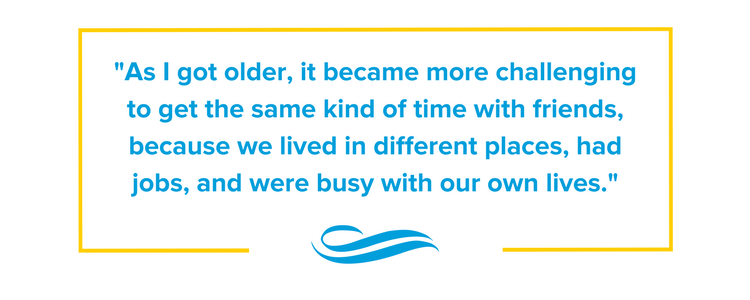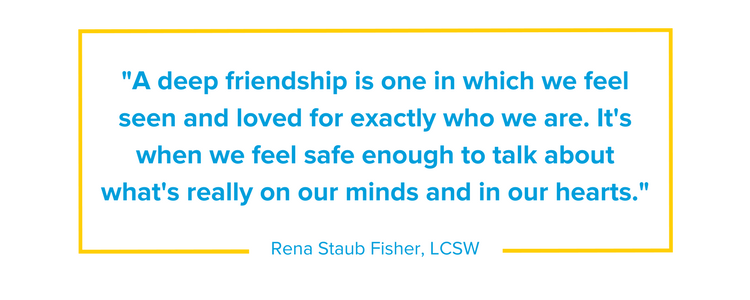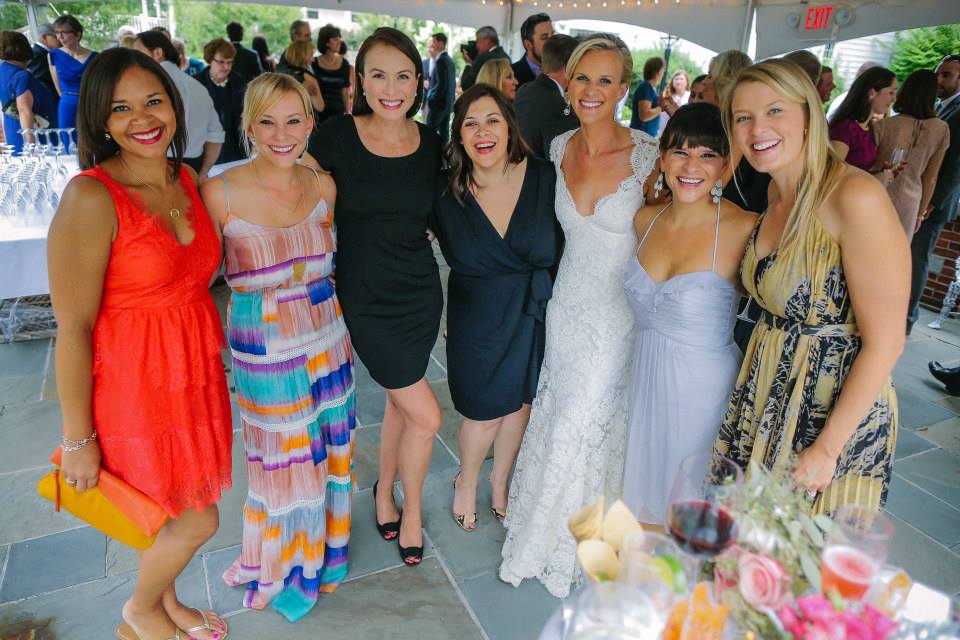I have always been in awe of the way my dad approached friendship. Seriously, he could teach a master class on how to make and maintain friends. He’s had the same best friend since he was about 5 years old, he organizes a reunion every year with the guys who lived on his floor in college, and even with four kids, he makes time to see or talk to all of his friends (the ones he’s had since he was 5 and the new friends he’s made now that he’s newly retired) as often as possible.

I had hoped that having deep friendships would be something in my genes, that making and maintaining friends would be an innate trait that I had, like my mother’s eyes or my father’s cheeks — but sadly, it wasn’t. I was a pretty awkward kid, with a tendency to overshare and curly hair that I thought was best tamed by running a brush through it (spoiler alert — it was not). When I was about 12 or 13, I found myself spending time with people who weren’t very nice, but who seemed popular. I got involved in the petty fights, the gossiping, and hurtful pranks like asking one girl what she thought of the other girl while the other girl was muted on the phone (that NEVER ended well).
The weakness of my friendships became very clear to me on my 13th birthday, when all of the invited guests never showed up. Good news: More pizza for me! Bad news: I realized that I didn’t have the kinds of real friendships that I had hoped for. I had forgotten the all-important step in having amazing friendships — I had to be an amazing friend.
At the time, I had hoped it would be as easy as going from a nerd to the popular girl in an 80s movie. You know, where all I had to do was take off my glasses and shake my hair out of a ponytail, and voilà! I was suddenly not only a total babe but also a person everyone wanted to hang out with.
It wasn’t that easy, but luckily it wasn’t that hard either. What I came to understand was that the cornerstone of any deep friendship is making the person you’re friends with feel like they really matter to you. When you are with them, you make them feel like the most important person in the room. We all crave understanding, attention, kindness, and someone to laugh at our jokes, and we look for that kind of care in our friendships.
When I was younger, that meant calling friends every night to rehash the events of the day, sitting with them at lunch, or supporting them by going to the school play because they got the solo — even when the play was SUPER long and pretty boring.
As I got older, it became more challenging to get the same kind of time with friends, because we lived in different places, had jobs, and were busy with our own lives. Our friendship activities sometimes had to be super planned out, like if I knew that they had a big job interview coming up, I would ask if we could get drinks the next night. Or shifting plans in my schedule if a guy a friend really liked ghosted them. By making time for my friends, they understood that they were a priority, and that the events in their lives really mattered to me.

In the process of being a kinder friend, something amazing happened — I started to be kinder to myself and accept all of the things that made me different. I let myself laugh loudly, say ridiculous things, and express my real opinions, unafraid of looking foolish — I was fully myself, and as it turns out, that person was actually pretty awesome!
The freedom to be authentic in a friendship is vital for developing more meaningful relationships, explains Rena Staub Fisher, LCSW, a therapist who works frequently with 20-somethings. “A deep friendship is one in which we feel seen and loved for exactly who we are. It’s when we feel safe enough to talk about what’s really on our minds and in our hearts — and when we trust that the things that make us quirky, unique, and different are the qualities our friend cherishes most about us.”
I worked to build these kinds of deep friendships throughout my high school and college years, but I found myself really creating them in my 20s. It was the first time I had lived away from my family and wasn’t in school, and I knew I needed relationships that were real. These friends helped me to become the person that I am today. I can look back on conversations with these friends about our values, our dreams, and our faith and know these are the friendships that shaped me. I’m so very grateful for the ways my deep friendships have made a difference in my life. Here are a few:
Improving my health
Deep friendships aren’t only wonderful because we have awesome conversations over brunch, but also because they have a positive impact on the quality of our lives. Amelia Pope, LCSW, a therapist in New York City, says that in her practice, she’s noticed that people who have more friends are generally physically and psychologically healthier.
“You rebound more quickly from trauma when you have more friends,” Pope says.
Personally, I found this to be true after I was involved in an accident where I almost died. After the crash, I was in the hospital for months, dealing with a tremendous amount of pain, and surrounded by doctors who told me that I would probably never walk again. Full disclosure, I wasn’t the most fun person to be around, but my friends never stopped showing up. They were there with me and there for me every step of the way. And seeing that I was still loved, even though I wasn’t the best version of myself, gave me hope. It made me optimistic about my future, and it helped me to feel strong enough to make a full recovery.
Expanding my world
When I was in my early 20s and working in event planning, I became friends with a writer. Our friendship grew over our mutual love of long walks and trying weird, hidden bars. Over time, he took me to different literary events, introduced me to other writers, and really encouraged me to give writing a try. I had never thought of myself as a writer, but if he thought I was good enough, then it was worth a shot! I began writing and eventually published a book. And I know that if it hadn’t been for that friendship, for being vulnerable and sharing some of my personal writing pursuits, I would have never had the courage to write professionally.

These kinds of encouraging occurrences are why we should have deep friendships. Pope explains: “The more friends that you have, the bigger your life is. Having more, varied people in your world brings in new experiences and a happier life.”
When a friend told me he was going to an open mic night to try his hand at stand-up, I offered to go along for moral support and wound up falling in love with it. I did comedy for years all over New York City. When a friend asked me if I wanted to go to a week-long festival in the desert called Burning Man, I thought they were crazy! I couldn’t imagine myself camping in the desert with no running water or electricity with a huge group of strangers. But he had such a wonderful experience that it convinced me to go, so I went and had the time of my life. These are experiences have changed my life in so many ways, and I know that I would have never been brave enough to try them if I didn’t have these friends in my life.
Taking the pressure off my other relationships
Another reason why it’s important to have deep and real friendships is because they can actually make your relationships with your family and your partner stronger. “Friendships provide a community, a social outlet, and in deeper friendships, care and support,” Pope says. “This can take the pressure off of a romantic relationship, in which the expectations to be lover, confidant, best friend, and partner are already so high.”
My fiancé and I have been together for more than three and a half years, and I often feel myself putting unrealistic expectations on him, needing him to be everything for me and our relationship all at once. A few months ago, I came to him about a problem with my consulting work not being steady and how insecure that was making me feel. He responded to my problem by saying, “I’m sorry, babe,” … and that was it.
I felt my eyes fill up with tears of frustration. Why couldn’t he talk through things with me like my best friend did? I left the apartment to take a walk. As I walked, I wondered what was missing from that interaction that I usually got from my best friend? Was it the back and forth conversation? The soothing, “Yes, I totally understand” affirmations? Or was it a feeling that this was going to be okay? By the end of the walk I realized that it was all of those things. And if I needed someone to listen to me like my best friend, maybe I should give that best friend a call, instead of expecting my fiancé to be my partner/best friend/roommate/family all rolled into one.
Being vulnerable
This is going to shock everyone, but I’m not perfect. I lose my temper, I can get snappy when I need a snack, and sometimes not having full control over situations makes me super anxious. In new friendships, I had to be honest about who I was — the good parts and the more challenging parts. I understood that I had to be fully myself to make real friends. If I pretended to be someone other than myself, then people were making friends with this idea of me, not who I actually was.
This meant I needed to be vulnerable and be open to the fact that someone I wanted to befriend might not be into the parts of me that aren’t all giggles and sunshine — which means there could be rejection and hurt. But, on the flip side, it has allowed me to become a person who is confident and self-assured who has true and deep friendships with people who love me for me.

Looking forward in friendships
My life continues to shift and change in ways I hadn’t anticipated — I got engaged, I lost my job, I started a new career. Whenever these events happen, my first impulse is to grab my phone and call my best friends. They give me advice and support that can only be given by someone who really, really knows you. Somehow, hearing their voices makes me feel more safe, happier, less lonely, and like everything is going to be okay — it’s like a deep exhale.
But I know that feeling — and the friendships that come along with it — takes work. At times, it means foregoing something — maybe a little bit of sleep to pick up the phone when a friend calls at 2 a.m. crying, or the cost of a bridesmaid’s dress that you know that you’ll never wear again, or maybe it’s giving up a night out when your friend needs someone to stay in with them and just listen.
All of the things that you give up in order to nurture deeper friendships pale in comparison to what you receive, which is someone who knows you, loves you, and would do the exact same thing for you.